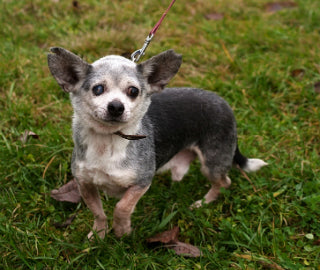Coping with Sight and Hearing Loss in Your Senior Dog

Too often people assume that when a senior dog has medical issues that it must be due to their age so one of the first things I recommend if you are seeing signs that they are not seeing as well as they used to, or that they are having trouble hearing, is to visit your vet to rule out an underlying medical cause. Sometimes it is not age at all causing the problems so it's always best to get an expert opinion.
Signs of Hearing Loss:
I find identifying hearing loss a bit difficult because if you have dogs like mine you are always wondering if it's a problem with their hearing or are they just ignoring me - both are definite possibilities! Right now I am going through this with Milo, my 11 1/2 y/o pug mix. Sometimes it seems obvious that he is not hearing me, but then moments later he will have me second guessing since he will respond immediately to a voice command. He has been to the vet and is very healthy, so I will continue to monitor him and look for signs such as:- Being startled when you touch them or when they are sleeping
- Not reacting to sounds they used to respond to
- Difficult to wake when sleeping
- Being much more vocal in their demands
- Ears that remain still instead of moving around to hear
Signs of Vision Loss:
I find vision loss a little easier to notice and like with hearing, the decline is usually gradual if it is age related. Look for:- Tripping or bumping into furniture or walls
- Disorientation or nervousness especially in new environments
- Not recognizing you from a distance
- Not able to catch things the way they used to
- Change in the look/colour of their eyes
To help make life easier for your vision or hearing impaired dog there are some simple tips that can make a huge difference in keeping them safe, comfortable and happy.
- Use gates to block off stairs
- Keep things as much the same as possible
- Use hand signals (for hearing impaired)
- Make sure food and water is easily accessible
- Remove clutter where possible
- If you do need to take them into new environments always bring something familiar like a toy or a companion
- Encourage their reliance on other pets in the family
I have had dogs that became completely blind and completely deaf and while it sounds very scary you would be amazed at how well dogs adapt. We all know that dogs are amazing at taking any challenge life throws at them in stride, but aside from their can-do attitudes what should give you comfort is their reliance on their sense of smell.
A dog's sense of smell is exponentially more important to them than sight or sound as a means of identifying and navigating their environments. It gives me great comfort, and hopefully it will for you as well, knowing that even in blindness and even without being able to hear, they can use their sense of smell to find their way happily through this stage of life.
Ann-Marie Fleming is the Founder & CEO of Dog Quality, a provider of products focused on improving the quality of life for older dogs.

